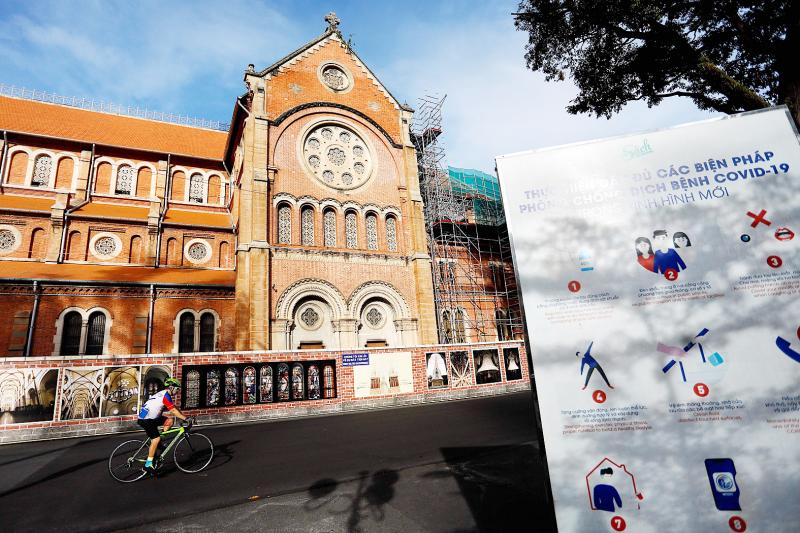Vietnam’s Ho Chi Minh City yesterday began a two-week lockdown in the hope of containing the nation’s worst COVID-19 outbreak.
The city of 9 million had previously been subjected to travel restrictions for one month, but infection rates were steadily rising — with more than 9,400 cases registered.
Before the outbreak began in late April, Vietnam had recorded fewer than 3,000 cases nationwide.

Photo: AFP
Vietnamese authorities are not using the term lockdown, but are calling the measures “social isolation orders.”
Ho Chi Minh City residents are barred from gathering in groups larger than pairs in public, and people are only allowed to leave home to buy food, medicine and in case of emergencies.
Police have set up checkpoints at city borders and only those with negative test results can get in.
Airlines can carry a maximum of 1,700 passengers to the capital Hanoi per day, aviation authorities said, while trains between Vietnam’s two major destinations have been suspended.
“Our busy city has become extremely quiet,” said Tran Phuong, a resident of the city. “I am anxious that these strict measures cannot help because the virus is now deep across the community.”
Vietnam had once been hailed as a model for virus containment as a result of extensive contact tracing and strict quarantine regulations. All close contacts of virus patients have been put in state-controlled quarantine facilities.
Ho Chi Minh City was the first to adjust the strict policy, allowing close contacts to home quarantine because state-run isolation centers are overrun.
Earlier, state media reported more than 80 inmates and guards had tested positive for COVID-19 at the city’s Chi Hoa jail.
Gunshots rang out from inside the prison on Tuesday, but it remains unclear what happened.
Vietnam is juggling its desire to contain the virus with its economic growth goals.
The nation has been among the best performing economies in Asia, reporting strong growth of 6.61 percent in the second quarter.
“The lockdown ... is too hard. It will severely affect people. Our business has been suspended, so no income. Our life has been quite difficult,” motorbike parts trader Nguyen Thi My Dung said.
Vietnam, which has a population of close to 100 million, has administered almost four million doses of COVID-19 vaccines.
Authorities want to reach herd immunity by the end of the year or early next year. Vietnam is developing its own vaccines and has ordered millions of doses from abroad.

ELECTION DISTRACTION? When attention shifted away from the fight against the militants to politics, losses and setbacks in the battlefield increased, an analyst said Recent clashes in Somalia’s semi-autonomous Jubaland region are alarming experts, exposing cracks in the country’s federal system and creating an opening for militant group al-Shabaab to gain ground. Following years of conflict, Somalia is a loose federation of five semi-autonomous member states — Puntland, Jubaland, Galmudug, Hirshabelle and South West — that maintain often fractious relations with the central government in the capital, Mogadishu. However, ahead of elections next year, Somalia has sought to assert control over its member states, which security analysts said has created gaps for al-Shabaab infiltration. Last week, two Somalian soldiers were killed in clashes between pro-government forces and

Ten cheetah cubs held in captivity since birth and destined for international wildlife trade markets have been rescued in Somaliland, a breakaway region of Somalia. They were all in stable condition despite all of them having been undernourished and limping due to being tied in captivity for months, said Laurie Marker, founder of the Cheetah Conservation Fund, which is caring for the cubs. One eight-month-old cub was unable to walk after been tied up for six months, while a five-month-old was “very malnourished [a bag of bones], with sores all over her body and full of botfly maggots which are under the

BRUSHED OFF: An ambassador to Australia previously said that Beijing does not see a reason to apologize for its naval exercises and military maneuvers in international areas China set off alarm bells in New Zealand when it dispatched powerful warships on unprecedented missions in the South Pacific without explanation, military documents showed. Beijing has spent years expanding its reach in the southern Pacific Ocean, courting island nations with new hospitals, freshly paved roads and generous offers of climate aid. However, these diplomatic efforts have increasingly been accompanied by more overt displays of military power. Three Chinese warships sailed the Tasman Sea between Australia and New Zealand in February, the first time such a task group had been sighted in those waters. “We have never seen vessels with this capability

‘NO INTEGRITY’: The chief judge expressed concern over how the sentence would be perceived given that military detention is believed to be easier than civilian prison A military court yesterday sentenced a New Zealand soldier to two years’ detention for attempting to spy for a foreign power. The soldier, whose name has been suppressed, admitted to attempted espionage, accessing a computer system for a dishonest purpose and knowingly possessing an objectionable publication. He was ordered into military detention at Burnham Military Camp near Christchurch and would be dismissed from the New Zealand Defence Force at the end of his sentence. His admission and its acceptance by the court marked the first spying conviction in New Zealand’s history. The soldier would be paid at half his previous rate until his dismissal